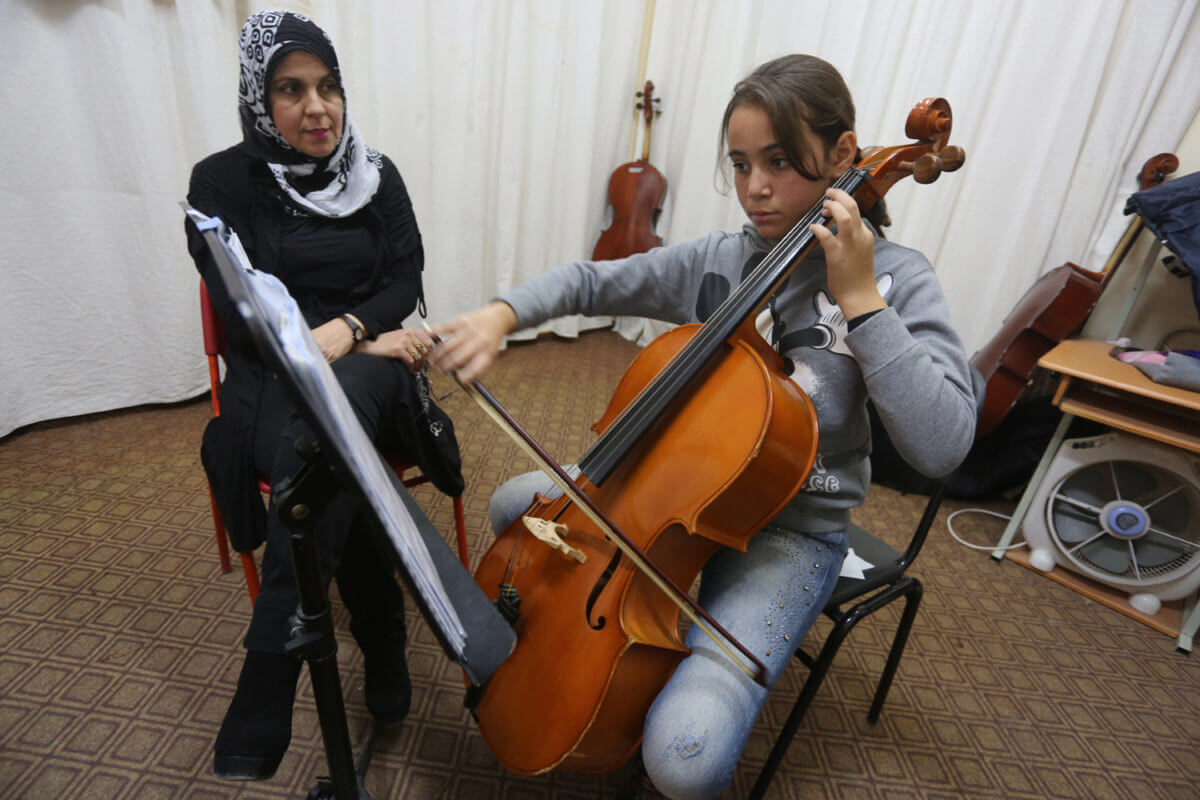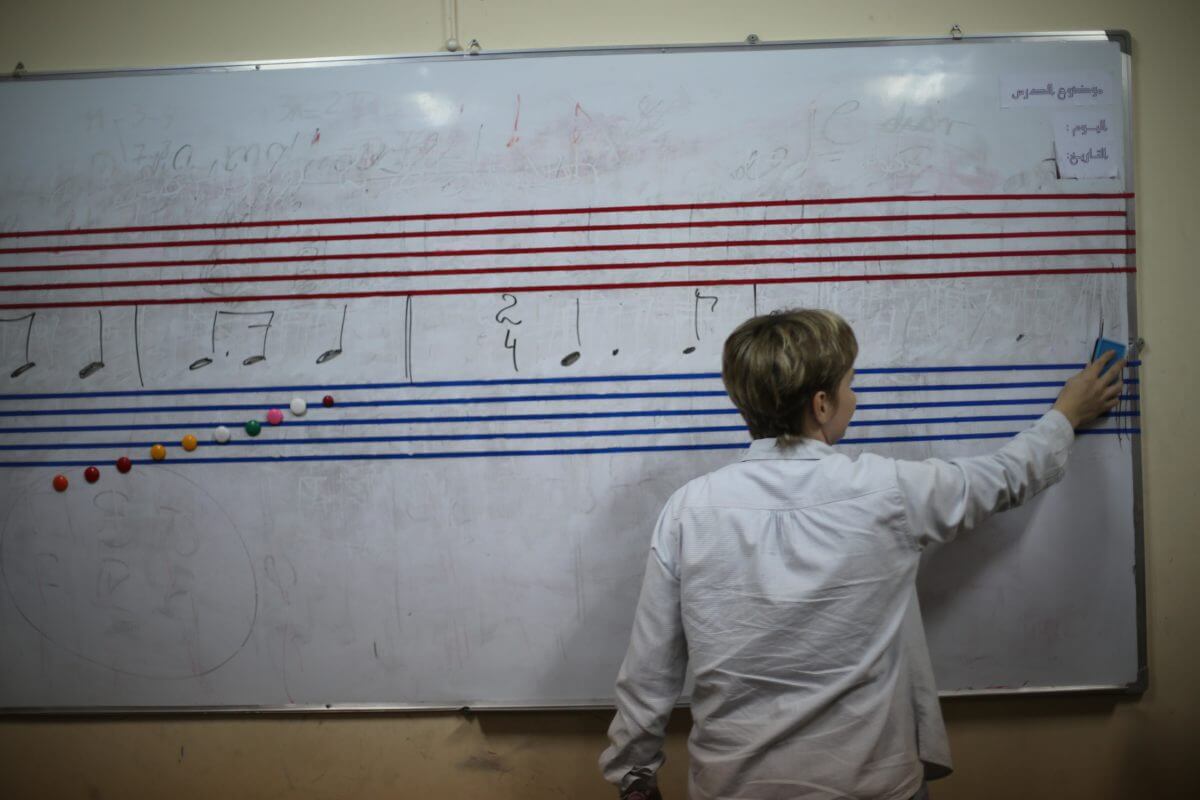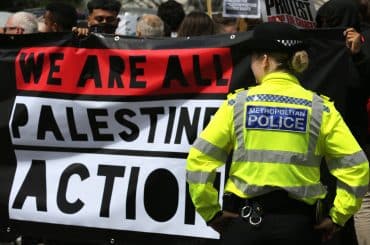Just outside a building in the Tal al-Hawa neighborhood of Gaza City a group of young people gather under a window to listen to the beautiful classical music coming out of the window a few meters above.
The window belongs to a small apartment used as a modest music school, which runs without proper lighting due to long hours of power cuts in Gaza. The music they’re listening to is played by Raslan Ashour, 16, who is practicing Mozart’s “Exsultate, Jubilate” on a trumpet.
As he started to play another melody, Natasha Radawn, his tutor watches closely and smiles. “His performance has improved a lot, despite some tiny mistakes,” she says.
Ashour’s passion to learn oriental and western classical music was not very welcomed by his mother who believed her son should learn “something more useful” such as management, in order to be like his father who works in the fashion business.
“My father is the one who bought me the trumpet in the first place. I have a dream of being a maestro waving a baton in front of an orchestra. Why not? I would love to be that person,” Ashour told Mondoweiss.

The Gaza Music School was established in 2008 as part of the Edward Said National Conservatory of Music, and was damaged by the war took place on Gaza at the end of the same year. Said established the main branch of the music institute in Jerusalem under the slogan: Today an orchestra, tomorrow a state. “The state is not the stone streets and buildings or economy, the state is culture,” Suhail Khoury, director of the conservatory, said in a 2014 statement.
Music education is not common in Gaza but now nearly 190 eager students are gathering in the rooms of this school. Many hope to use their instruments to escape from the turbulent situation in the besieged Gaza Strip to quite a different world.

In one of the rooms, Kuzam Hejjo, 11, holds her cello while trying to read Tchaikovsky’s “The Nutcracker” from an old set of sheet music brought from Russia by her tutor, who moved to Gaza after marriage.
“I imagine myself a very little person that can go through music and start jumping on its strings, such as the cartoon character (Barbie Mariposa),” she told Mondoweiss.
Hejjo’s parents believe that it is time to pay more attention to her studies or join a sports club. About half of the students end up leaving the school to pursue other fields. Many also think it is not a suitable time for music due to the political situation in Gaza.
“These instruments and music arts in general are part of the war in Palestine, and they have a huge impact not less than that of the K47 bullets,” says Yelina Lidawi, 28, a music tutor originally from North Ossetia. “Music is part of the people’s heritage and historic struggle,” Lidawi added.

But Samy Rabah, 15, was among those who left the school after being mocked by his friends because he shared his photo on Facebook playing a guitar. “I could not take this kind of disapproval, it looked stupid and I thought that this guitar will bring me shame,” he said.
After leaving music school Rabah joined a youth training camp organized by Hamas. He was one among 30,000 youths who have joined these camps to undertake strenuous training for a few weeks each summer. Rabah’s father, who runs a small grocery shop, said that the “liberation of Palestine does not need music or drums, while Israel is so good at playing the drums of war and so prepared to attack us anytime.”

Meanwhile, Haiyfa Abu Shamla, 13, deals with these circumstances differently and keeps going to the music school. On her violin she plays a famous song about Palestine by the legendary Lebanese singer Fairuz titled, “I’ll not forget Palestine”.
Her parents keep encouraging her to play whenever it is possible, including family events. “To play music means to spread happiness among others. On the contrary, I think that even the ones who used to make people suffer and were involved in killing and destruction, would not mind to have moments of joy and happiness,” Abu Shamla says.
The kind of happiness that she wants is not an easy thing to get within the limited financial and technical capacity the music school has. The lack of adequate music curriculum in Gaza universities imposes further challenges on the future of music education, and threatens the expansion and growth of a generation in Gaza that loves music.





I learned music (cello) as a kid and stuck with it. Now I am 77 and it centers my life. But I was privileged to live in a country which war did not visit closely (USA) and I have no idea about how the troubles in Gaza affect music-learning and music-playing. I hope some of the kids keep going with it and I salute the Edward Said (Palestine) Nat’l Conservatory of Music for doing what it can.
The banning of Music kills the soul of a People as well as the soul of the individual !
Imho it is a crime against humanity .
Music is even more of a necessity during the cruelties and horrors of wartime
as the French say ” La musique adouçit les moeurs !
Impressive, these Palestinians. Hard not to compare them with our USA’s whiney, entitlement culture.